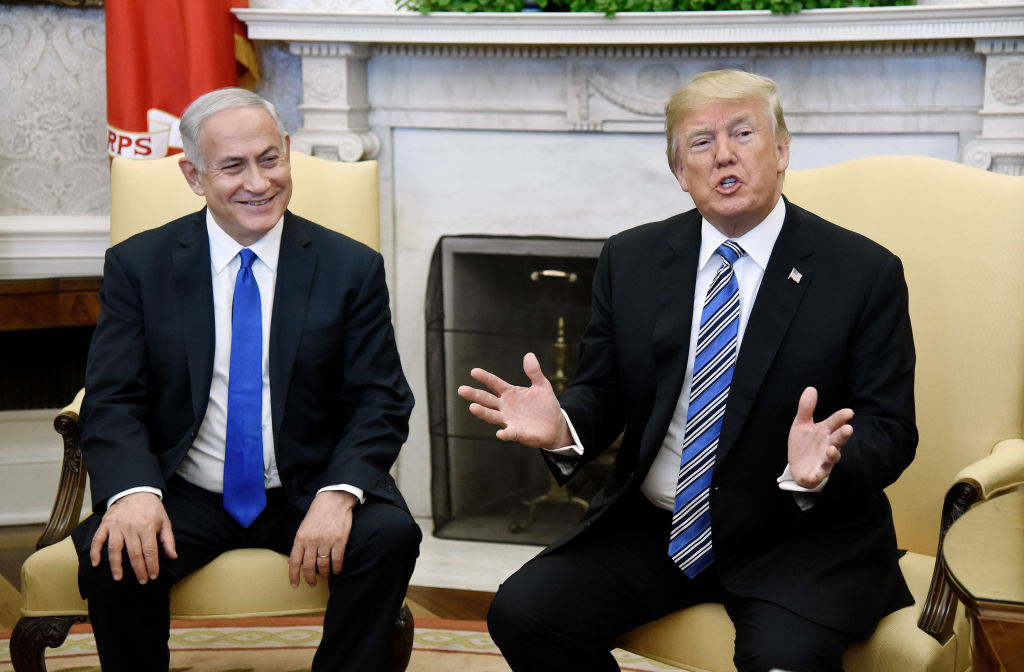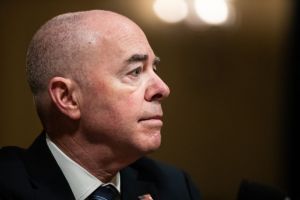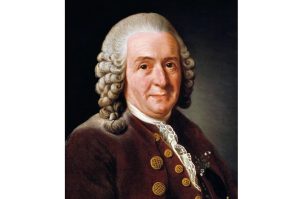On the morning of November 9, 2016, as world leaders woke up to the Republican candidate’s unexpected victory, only one of them had a previous relationship with Donald Trump. Attempting to come to terms with the president-elect, presidents and prime ministers were frantically putting calls through to the Trump Tower switchboard, hoping to arrange introductory conversations. Benjamin Netanyahu didn’t have to.
The two men went back thirty years. When Israel’s prime minister was a dashing ambassador to the United Nations, cutting his swathe through Manhattan, he had been introduced to the upcoming real-estate entrepreneur. Though he and Trump were never close, they remained in contact over the years. Trump’s name appeared on a hand-written list Netanyahu prepared for one of his aides, of potential donors and benefactors.
During Israel’s elections in 2013, at the request of an American supporter Trump recorded a video endorsing Netanyahu – “Vote for Benjamin. Terrific guy, terrific leader. Great for Israel.”
Nevertheless, when it came to Trump the candidate, Netanyahu was extremely circumspect about endorsing him. The last thing he wanted was to anger Hillary Clinton who had said in an interview “I’ve known Bibi a long time. And I have a very good relationship with him, in part because we can yell at each other and we do. And I was often the designated yeller.” Netanyahu was preparing himself for another four years of yelling.
But despite his apprehension over another Clinton presidency, he wasn’t praying for a President Trump either. Netanyahu had been close to the GOP leadership for many years and Trump was like no Republican politician he had ever known. After eight years of hostility with Obama, he dreamed of having one of the parties pro-Israel stalwarts in the White House, someone predictable like Lindsey Graham.
“Bibi is a risk-averse politician. He dislikes instability and Donald Trump is the opposite of the kind of leader he want to deal with,” said one of Netanyahu’s aides in the days before the election.
“You want to control your own politicians,” Trump had told a group of Jewish Republican mega-donors during his battle for the nomination. “You’re not going to support me because I don’t want your money.”
Many of the Republican party’s influential Jewish members, including leading conservative columnists, were prominent in the “Never Trump” movement. Netanyahu was wary of a president who wasn’t part of the establishment he had worked with for so long. “Bibi is scared of both candidates,” said another member of his term on the eve of the election.
The morning after the election, Israel’s ambassador in Washington, Ron Dermer, who doubles as Netanyahu’s closest foreign-policy advisor, allayed his fears. Dermer is a proponent of shifting Israel’s main base of support in the US, away from the largely liberal mainstream of the American-Jewish community, towards a more right-wing constituency, combined of the smaller Orthodox Jewish groups and the much larger base of staunchly pro-Israel Christian evangelists.
Dermer had done the groundwork. Unlike Netanyahu, he was already a fan of Trump and had good working relationships with a number of key players in Trumpworld, including strategist Steve Bannon and son-in-law Jared Kushner. They were admirers of Netanyahu. The Kushner family had hosted Netanyahu in the past on speaking tours in the US when he was in opposition, Jared even once vacating his bedroom for the then ex-prime minister. The Breitbart website, of which Bannon had been chairman, had been founded originally by journalist Andrew Breitbart following a meeting with Netanyahu in Jerusalem.
Bannon and Kushner were not the only allies Dermer and Netanyahu had in the Trump White House. In addition to Kushner, who was put in charge of Middle East diplomacy, there were David Friedman and Jason Greenblatt, two of Trump’s veteran lawyers and like Kushner, Orthodox Jews who supported the Israeli settler community. Friedman was appointed the new ambassador to Israel while Greenblatt would be Trump’s special representative for international negotiations. But even though Netanyahu was delighted by these appointments, he was still worried about other, less pro-Bibi voices in the president’s ear, like then State Secretary Rex Tillerson and National Security Advisor H. R. McMaster. Netanyahu was well aware Trump is susceptible to the last person he speaks to. He was also worried that the man who had originally introduced them in the 1980s, billionaire cosmetics heir, Ronald Lauder, once a patron of Netanyahu’s but now an estranged critic, was counseling his old friend Trump to put diplomatic pressure on Israel to secure a diplomatic breakthrough.
In many ways, Netanyahu and Trump cannot be more different. Netanyahu is an intellectual, who reads and thinks deeply about history, economics and geopolitics. So unlike the shallow and impulsive Trump. But they both share an uncanny ability to connect on almost a metaphysical level with the fears and resentments of their voters. Even though neither of them, having been born in to privileged families, have shared any of their supporters hardships, they relate to their phobias. Netanyahu, as a politician, has been doing this for much longer than Trump. Nevertheless, as he drew closer to the new president, he marveled at how he riled the media and cultural elites. “Be like Trump,” he daily cajoled his team, as he increasingly adopted the combative tone and the “fake news” vocabulary, in his speeches and on social media.
Netanyahu, a ruthless pragmatist, was better prepared than other world leaders for another geopolitical development. Despite his own upbringing in the United States (where he spent his teens and much of his twenties and early thirties), and his political alignment with the hawkish Republican establishment, he was ready for Trump’s pivot towards Putin.
As a young diplomat in Reagan’s America, he had warned of KGB training camps for Palestinian terrorists. Thirty years later, he watched, dismayed as Barack Obama forfeited America’s role in the region and days after Russia deployed its aircraft to Syria, Netanyahu was in the Kremlin to work out an arrangement whereby Israel would not jeopardise Putin’s client, Bashar Assad, but would have free rein to continue targeting Iranian forces in Syria.
He has grasped better than anyone else that in the era of Trump and Putin, personal relationships based on joint strategic interests, trump liberal values and traditional diplomacy. Which is why he made sure two weeks ago to speak at length, individually with both men, as he knew he couldn’t rely on Trump’s short attention-span alone, in advance of the Helsinki summit, ensuring that Israel’s agenda on Syria, would be respected there. He has understood that this is a time when traditional by-the-book leaders like Germany’s Angel Merkel have lost much of their influence, and instead Netanyahu has focused his attention on power-players like India’s Narendra Modi and the Saudi Crown Prince Mohammed bin Salman. These are the people Trump respects.
Bannon may have lost favour for now in the Trump White House, but so have Tillerson and McMaster disappeared, to be replaced by hawks like Mike Pompeo and John Bolton, men much more attuned to Netanyahu’s thinking. Liberal American Jews may be dismayed by an Israeli prime minister who won’t call out a president who calls white supremacists “fine people”, but he doesn’t care. He believes Israel’s future is bound up with populists like Hungary’s Viktor Orban and Evangelicals like Vice President Mike Pence, the man who was behind the decision to move the US embassy to Jerusalem. Netanyahu knows better than to ever criticise Trump in public.
And he knows just how to prey on his vanity, not just in personal meetings and calls, but in repeated interviews with friendly Fox News anchors, who can be relied up not to ask the awkward questions other journalists do. This is how Trump was prevailed on to reverse the entire US policy on Iran and manipulate the Palestinians in to a position where they have already been forced to reject the Trump Peace Plan, before it has even been presented.
With the exception perhaps of Putin, Netanyahu is now the leader who understands the president of the United States best.
Anshel Pfeffer is the author of Bibi: The Turbulent Life and Times of Benjamin Netanyahu (Hurst Publishers)


















